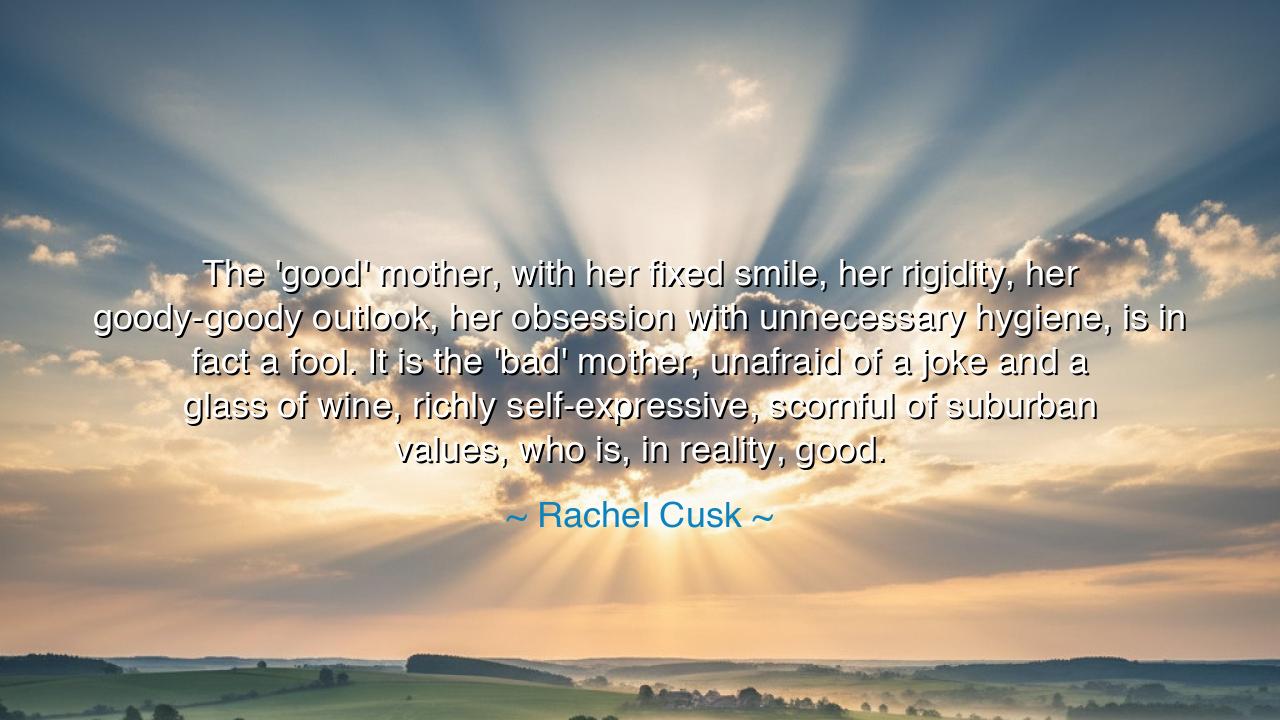
The 'good' mother, with her fixed smile, her rigidity, her
The 'good' mother, with her fixed smile, her rigidity, her goody-goody outlook, her obsession with unnecessary hygiene, is in fact a fool. It is the 'bad' mother, unafraid of a joke and a glass of wine, richly self-expressive, scornful of suburban values, who is, in reality, good.






Hear now, O seeker of wisdom, the fierce and unflinching words of Rachel Cusk: “The ‘good’ mother, with her fixed smile, her rigidity, her goody-goody outlook, her obsession with unnecessary hygiene, is in fact a fool. It is the ‘bad’ mother, unafraid of a joke and a glass of wine, richly self-expressive, scornful of suburban values, who is, in reality, good.” Though sharp in tone, these words unveil a profound teaching about truth, identity, and the deception of appearances.
The meaning of her words is rooted in rebellion against false ideals. Society often praises the image of the “good mother”—disciplined, restrained, neat, always smiling, endlessly compliant with what culture demands. Yet, Cusk pierces through this image, declaring it hollow, calling it foolishness. The fixed smile and rigidity mask not virtue but imprisonment. In contrast, the so-called “bad mother,” who laughs freely, who enjoys life, who resists the suffocating pressure of suburban perfection, is the one who gives her children true life and freedom. For it is honesty, not artifice, that nurtures the soul.
The origin of such wisdom stretches back to ancient teachings. In many traditions, the false idol of outward virtue has been unmasked as a shadow of the truth. The Stoics warned against those who lived only for appearances rather than for inner strength. The Gospels told of Pharisees who appeared righteous outwardly but were hollow within. Likewise, Confucian wisdom counseled harmony and authenticity over the empty rigidity of face-saving. Cusk continues this lineage by showing that parental love must be lived with authenticity, not suffocated by the mask of perfect formality.
History offers examples that illuminate her claim. Consider the Victorian mothers, bound by social rules to be paragons of morality, cleanliness, and self-restraint. Their households gleamed, but often their children were raised in fear and silence, yearning for warmth. Contrast this with mothers like Eleanor Roosevelt’s own, remembered not for conformity but for courage and laughter, whose openness of spirit gave her children strength. The lesson is clear: it is the spirit of freedom, not the prison of appearances, that truly raises strong souls.
Cusk also calls us to reconsider the nature of goodness itself. True goodness is not about meeting social checklists or performing virtue to win approval. It is about presence, humor, honesty, and joy. A mother—or indeed any person—who can laugh, who can live fully, who resists oppressive conformity, gives to others a gift greater than spotless floors: the gift of authentic humanity. Her “badness” in society’s eyes becomes her deepest goodness.
Practically, this wisdom instructs us to embrace authenticity over performance in our own lives. Whether as parents, partners, or friends, we must not let ourselves be trapped in the rigid roles society imposes. Instead, we must be willing to laugh, to drink life deeply, to express ourselves richly. This freedom is not selfishness—it is nourishment for those around us. A child raised by laughter and truth grows wiser than one raised under the weight of repression.
So, O listener, let us abandon the tyranny of the fixed smile and the suffocating chains of false virtue. Let us instead live as the “bad” who are truly good—brave enough to laugh, honest enough to scorn shallow appearances, and free enough to give others the gift of authentic joy. For the world does not need more rigid masks; it needs radiant, imperfect, truthful hearts.
Thus the teaching endures: the one who rejects the false image of being “good” may in fact embody the deepest goodness, for authenticity, humor, and freedom nourish the spirit more than rigid perfection ever could.






AAdministratorAdministrator
Welcome, honored guests. Please leave a comment, we will respond soon